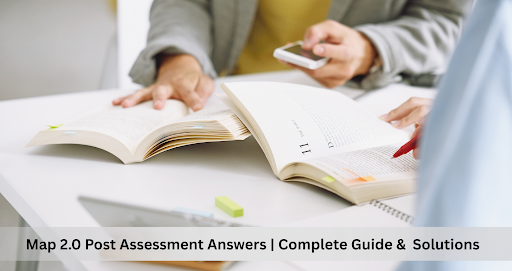Navigating your way through the complexities of education can be challenging, especially when it comes to assessments.
The Map 2.0 Post Assessment is a critical tool designed to evaluate your understanding and mastery of key concepts in various subjects.
Whether you’re preparing for an exam or simply looking to deepen your knowledge, having access to accurate and comprehensive answers is essential.
This post aims to demystify the Map 2.0 Post Assessment Answers by providing insights into what they entail, common questions you might encounter, and effective strategies for leveraging this information in your studies.
From tips on review techniques to reliable sources where you can find these answers online, we’ve got everything covered.
Get ready to enhance your learning experience with our complete guide tailored specifically for those seeking success!
Understanding Map 2.0 Post Assessment Answers: What You Need to Know
The Map 2.0 Post Assessment is an essential component of educational programs that aims to gauge a learner’s grasp of specific subject matter.
Understanding the answers associated with this assessment can significantly enhance your academic performance.
These assessments typically cover a wide range of topics, from theoretical concepts to practical applications.
Each question is designed to test not only recall but also comprehension and critical thinking skills. Familiarizing yourself with the types of questions asked can be beneficial.
When you review the Map 2.0 Post Assessment Answers, it’s crucial to analyze more than just correct responses.
Take note of why certain answers are right or wrong; understanding the rationale behind them will deepen your knowledge and improve retention.
Many students find themselves struggling with specific concepts during their assessments. The post-assessment answers serve as a valuable resource.
It is for identifying weak areas in your understanding, allowing you to focus on those topics going forward.
Additionally, collaboration can amplify learning outcomes when using these answers. Discussing questions and solutions with peers may provide new perspectives that enrich your understanding further.
It’s important also to consider how often you revisit these answers while studying for exams or future assessments. Regularly reviewing them helps reinforce what you’ve learned and keeps the information fresh in your mind.
Always cross-reference multiple sources when looking up Map 2.0 Post Assessment Answers online. Using reliable resources ensures you’re getting accurate information that aligns well with what you’ve studied in class.
Common Questions in Map 2.0 Post Assessment Answers Explained
When navigating the Map 2.0 Post Assessment, students often encounter questions that challenge their understanding of key concepts. These questions are designed to assess comprehension and application of learned material.
One common type of question focuses on terminology used throughout the course. Students may be asked to define specific terms or explain their relevance in a broader context. Understanding these terms is crucial for success.
Another frequently seen format involves scenario-based questions. Here, students must apply what they’ve learned to practical situations. This tests not just recall but also critical thinking skills as they analyze different aspects.
Multiple-choice questions are prevalent as well, offering various answers where only one is correct. These can sometimes confuse test-takers due to closely related options that require careful consideration before selecting an answer.
True or false statements also appear regularly within the assessment. They gauge whether students grasp foundational truths about the subject matter.
Without needing extensive explanation, making them quicker yet vital components of evaluation.
Open-ended responses may arise too, allowing students to express their understanding more freely. These types of questions encourage deeper insight into topics and provide educators with better perspectives on student knowledge levels.
Practice problems might be included in assessments focusing on quantitative elements relevant to map analysis or geographical data interpretation.
Mastering these problem-solving techniques enhances analytical capabilities essential for future studies or careers in geography-related fields.
How to Effectively Use Map 2.0 Post Assessment Answers for Study
Using Map 2.0 post assessment answers can significantly enhance your study routine. The key is to approach them with a strategic mindset.
Start by familiarizing yourself with the format of these assessments. Understanding question types and structures will prepare you for what to expect.
Once you have an overview, integrate the answers into your study sessions. Don’t just memorize; instead, analyze each response critically.
Ask yourself why certain answers are correct and how they relate to broader concepts covered in your course material.
It’s beneficial to create flashcards from the map 2.0 post assessment answers as a memory aid. Write down questions on one side and corresponding answers on the other side, allowing for effective self-testing later on.
Group study sessions can also be advantageous when using these assessment answers. Discussing different perspectives enhances comprehension and retention of information.
While allowing peer insights that may clarify confusing topics.
Don’t forget about practicing active recall during your studies with these responses at hand. Instead of passively reading through them, try recalling information without looking first, then check against the provided answers for accuracy.
Utilize online resources or forums related to Map 2.0 to further enrich your understanding of specific topics within those assessments. Engaging in discussions can shine light on nuances you might not have considered previously.
Regularly revisit previous assessments as part of spaced repetition techniques in studying effectively over time allows long-term retention rather than cramming before exams or deadlines approaching quickly.
Tips for Reviewing Map 2.0 Post Assessment Answers Successfully
Reviewing Map 2.0 post assessment answers requires a thoughtful approach. Start by organizing your study materials in one place. This will help you avoid wasting time looking for resources later.
Next, create a dedicated study schedule that allocates specific times for review sessions. Consistency is key when it comes to retention and understanding of the material.
As you work through the assessment answers, take notes on areas where you struggle. Highlight these topics and revisit them regularly to reinforce your understanding.
Make use of active recall techniques while studying. Instead of passively reading the answers, try to recite or write down what you’ve learned without looking at your notes first.
Consider discussing challenging questions with peers or participating in online forums focused on Map 2.0 assessments. Engaging in discussions can provide new perspectives and deepen your comprehension of complex concepts.
Utilize flashcards as a tool for quick reviews between study sessions. They are especially effective for memorizing key terms and definitions related to the Map 2.0 content.
Practice self-assessment after each review session by quizzing yourself on different sections of the assessment answers you studied that day.
Testing yourself reinforces knowledge and builds confidence leading up to any exam or evaluation connecting back to these assessments.
Key Concepts Highlighted in Map 2.0 Post Assessment Answers
The Map 2.0 Post Assessment is designed to evaluate students’ understanding of critical concepts in their studies. It emphasizes various key areas that are essential for academic success.
One significant concept highlighted is the importance of data interpretation skills. Students must demonstrate proficiency in analyzing and making sense of information presented in various formats, such as charts and graphs.
Another crucial area focuses on problem-solving abilities. The assessment requires learners to apply theoretical knowledge to real-world scenarios, enhancing their critical thinking skills.
Communication plays a vital role as well. Effective articulation of ideas, whether written or oral, ensures that students can convey complex thoughts clearly and persuasively within the context of their assessments.
Collaboration is also emphasized throughout the Map 2.0 framework. Working with peers allows students to share insights, challenge each other’s perspectives, and develop a deeper understanding of course material together.
Additionally, self-assessment techniques are encouraged during preparation for these assessments. Understanding one’s strengths and weaknesses enables targeted study efforts leading up to exams.
Ethical considerations surrounding data use are paramount in today’s educational landscape.
Students learn about responsible practices regarding sourcing information and respecting intellectual property rights while conducting research or completing assignments.
These key concepts form a comprehensive foundation that supports effective learning strategies tailored toward excelling in academic evaluations like the Map 2.0 Post Assessment.
Where to Find Reliable Map 2.0 Post Assessment Answers Online
Finding reliable Map 2.0 post assessment answers online can be challenging. With so much information available, it’s crucial to know where to look for trustworthy sources.
Start by checking educational websites and platforms that specialize in assessments. Websites like Quizlet or StudyBlue often have user-generated content that can provide useful insights into the Map 2.0 post assessment answers you need.
Forums dedicated to education, such as Reddit’s r/OnlineEducation or various student groups on Facebook, can also be valuable resources.
Engaging with fellow students who have taken the same assessment may lead you to accurate answers and study materials.
Another option is academic blogs or websites run by educators. These sites usually offer more in-depth analysis of the subjects covered in assessments and might include sample questions alongside detailed solutions relevant to Map 2.0.
YouTube channels focused on educational content are worth exploring too. Many educators share their methods for tackling different assessments, including tips on how to answer specific types of questions effectively.
Don’t overlook official resources from your institution or organization administering the test. They may provide practice exams or guides containing helpful hints about what you might encounter in the actual assessment.
Consider joining online study groups specifically geared toward preparing for Map 2.0 assessments.
Collaboration with peers not only broadens your understanding but also gives access to shared notes and potential answers others have found effective during their studies.
Benefits of Using Map 2.0 Post Assessment Answers in Exam Preparation
Utilizing Map 2.0 post assessment answers in your exam preparation can significantly enhance your study effectiveness and confidence.
These resources provide a structured way to review content, allowing you to pinpoint areas where you may need additional focus.
One major benefit is the immediate feedback that these answers offer. They help identify both strengths and weaknesses in your knowledge base, enabling targeted revision strategies.
Instead of spending time on topics you already understand well, you can allocate more effort toward challenging sections.
Additionally, using these assessment answers cultivates familiarity with the format of questions you’ll likely encounter in actual exams.
This practice helps reduce anxiety and boosts performance on test day as you’re better prepared for what lies ahead.
Another advantage is the ability to explore different perspectives or explanations provided within various answer key resources online.
Engaging with diverse viewpoints can deepen understanding and contribute to critical thinking skills crucial for academic success.
Furthermore, by organizing study sessions around Map 2.0 post assessment answers, learners develop discipline and effective time management habits.
Skills that are invaluable not just during exams but throughout their educational journey.



